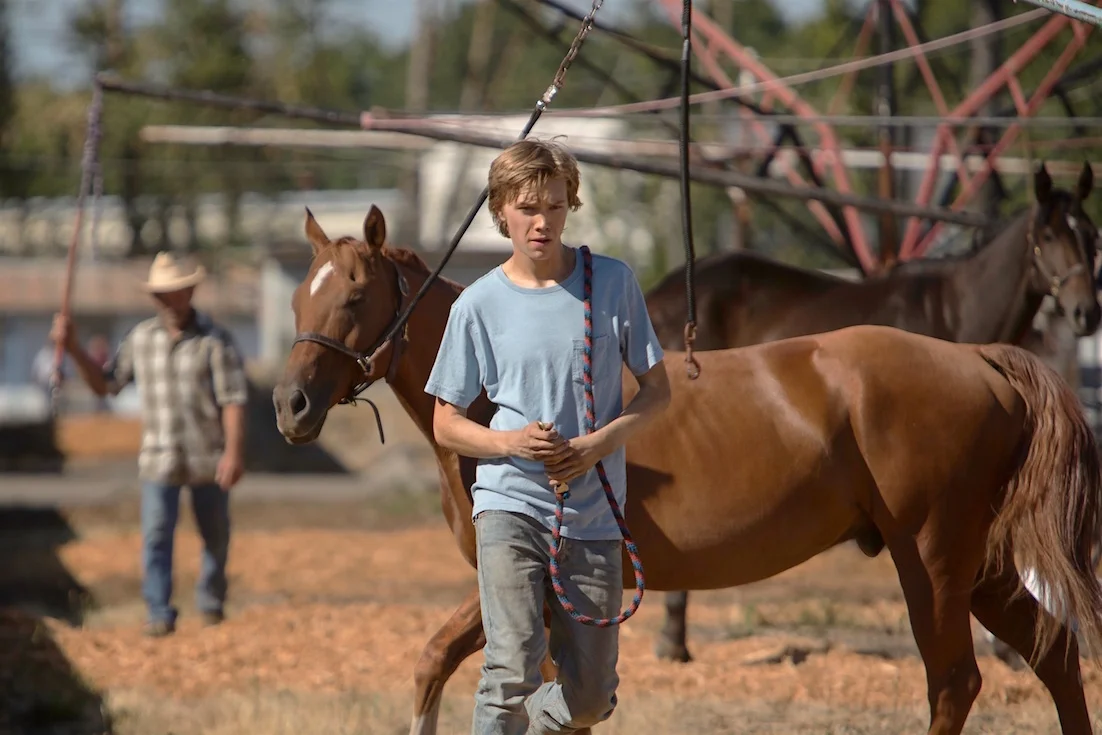Lean on Pete
No Home in A Cruel America
Originally Printed in Compass, May 10, 2018.
Horse movies occupy a special place in the pantheon of animal cinema. Dog stories are lessons in loyalty, but horse stories are about transformation, and an almost spiritual connection with a larger force. At the most awkward, unlikely time of their life, a young boy or girl, through a kind of divine intervention, will encounter a magnificent, often untamed stallion who will test the child’s resolve and gift them with a unequivocal sense of trust. It is the intensity and romance of this bond that will carry the child victoriously into maturity.
British writer-director Andrew Haigh’s a-boy-and-his-horse tale, “Lean on Pete,” is no coming of age story. It is an undoing of age. There are no poignant speeches on perseverance or heartfelt swells of an orchestral score, just the steady rhythm of often silent realism as life cripples the spirit of a sensitive young man.
Fifteen year-old Charley (Charlie Plummer), a lanky, soft-spoken boy lives with his single father, Ray (Travis Fimmel), in a roach-infested bachelor pad in Oregon furnished with cardboard boxes. The greatest luxury in his life, we learn, is a memory of once eating at a Red Lobster. Ray, a womanizer whose handsomeness has evidently carried him so easily through a hard life that he never learned to try, fills the empty fridge with beer and fills the room with affable stupidity.
A chance for something more, or at least something new, finds Charley as Del (Steve Buscemi), a weathered owner of weathered racehorses, employs him to muck out the stables where he meets Lean on Pete, a low-rung horse who seems to share the boy’s poor circumstances and gentle temperament.
One of Haigh’s greatest skills as a filmmaker is his patience. In “45 Years” he held lengthily, uncomfortably on Charlotte Rampling’s glacier expressions of marital dread. Here, it is not until well into the film, as Charley walks Pete around a rickety training carousel, talking fondly to the horse, that you realize you’re seeing him genuinely smile for the first time — all at a distance. “Lean on Pete” is a film of worn-down bodies, the camera lingering through doorways, bar crowds, or diner booths to capture the human strides as much as the horses. A close, careful examination of Plummer’s open face and wide-spread eyes is saved to better accentuate the more brutal pain that is to follow.
What Charley learns, too often, too late, is that everyone is exactly as they present themselves to be. The jockey (Chloë Sevigny) who tells him not to get attached to the horses doesn’t have a soft spot. Del, who pays him cheaply for work, is an employer, not a surrogate father. What he attempts to offer Charley in place of warmth is truth: even at the bottom, life is a financial game where the winners deceive and the losers are put down. Stubbornly optimistic, Charley believes he can save Pete, right up to the moment Del orders him to load the losing horse for transport to Mexico to be slaughtered. Instead, he steals Del’s truck and escapes with Pete into the night, only a handful of dollars in his pocket.
Their saga across the American desert, big skies and open plains epically shot as both painterly and terrifyingly expansive and merciless, is a descent into darkness, even as the sun hangs high. Charley weaves in and out of the lives of the poor, embittered and increasingly violent. The unmarked road to a possible safe haven in Wyoming is littered with lame horse-humans — numbed Iraq vets and mean, old drunks — shadow-selves of Charley’s possible future if he clings to a male pride that runs one further into the ground. Most frightening perhaps is the vagrant (Steve Zahn) who sees him as a peer. After all, what else is an unbathed teenager fleeing Social Services and waiting in line for a free shelter meal?
“I’m not homeless,” Charley counters.
“Actually, that’s exactly what you are.”
As the world closes in, there are many paths left in becoming a man: he can steal, cheat, drink, turn to violence, anything but actually feeling. There’s no reward there. Charlie Plummer’s expertly un-showy performance may initially seem breezy or blank, but he carefully reveals, as Charley unfurls, the fragile shell of a boy who has been desperately steeling himself for survival — until he can’t.
